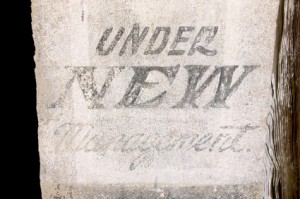[fusion_builder_container hundred_percent=”yes” overflow=”visible”][fusion_builder_row][fusion_builder_column type=”1_1″ background_position=”left top” background_color=”” border_size=”” border_color=”” border_style=”solid” spacing=”yes” background_image=”” background_repeat=”no-repeat” padding=”” margin_top=”0px” margin_bottom=”0px” class=”” id=”” animation_type=”” animation_speed=”0.3″ animation_direction=”left” hide_on_mobile=”no” center_content=”no” min_height=”none”]
The New Leader’s Series here at Management Excellence, is dedicated to the proposition that one of the most valuable things we can do is support the development of the next generation of leaders on our teams and in our organizations.
Beyond the certainty of death and taxes, one other absolute in life is that as a leader, you will make mistakes. A great number of them. From misspeaking to making a decision that turns out wrong to a million other areas to show off your humanness, mistakes are part of the learning to lead process. How you choose to deal with your mistakes will help determine people’s perception of you and speak volumes about your leadership character.
6 Suggestions for Dealing with and Benefiting from Your Mistakes:
1. Practice saying the words, “I was wrong.” For some of us, those words don’t flow easily, but they are the most powerful words in your vocabulary when it comes to dealing with your mistake. Anything less will sound like an excuse.
2. No “Buts” Please. Saying, “I was wrong, but,…” is just as bad as making up an excuse. Don’t be tempted to qualify your mistake…it just sounds weak and hurts your credibility.
3. Resist the urge to point your finger. If it happened on your watch or on your team, it’s your fault. Stories of bosses pointing fingers at others for their mistakes (and at themselves for the success of others) are legendary. It might be tempting to blame someone else when the boss is glowering at you, but resist the urge to point. Take your medicine and use your team member’s mistake as a developmental opportunity.
4. Share where you went wrong. If your gaffe was an interpersonal one, admit to the other party that you recognize what you did wrong. For example, “I shouldn’t have jumped to a conclusion before I heard all of the facts.” If the mistake was related to a decision, assess where you might have gone wrong and share the mistake. “I framed this problem wrong. I let emotions get in the way of a clear view to the situation, and I made a rash decision.” This is powerful credibility building juice and a teaching moment for everyone involved.
5. Apologize. The fine art of the workplace apology is often ignored in the workplace. Instead of a sign of weakness, it’s a sign of character and strength.
6. Keep a journal and review it to support your own improvement. I’m a huge fan of maintaining a decision and issue log and noting how my decisions work-out over time. Log the results and take a few minutes to jot down what you learned. Review the journal frequently.
The Bottom-Line for Now:
Rather than dwell on or attempt to hide your mistakes, confront them head-on, help everyone learn something, including professionalism under fire and move on!
—
Don’t miss the next Leadership Caffeine-Newsletter! Register here.
For more ideas on professional development-one sound bite at a time, check out Art’s latest book: Leadership Caffeine-Ideas to Ene rgize Your Professional Development.
rgize Your Professional Development.
Download a free excerpt of Leadership Caffeine (the book) at Art’s facebook page.
New to leading or responsible for first time leaders on your team? Subscribe to Art’ New Leader’s e-News.
An ideal book for anyone starting out in leadership: Practical Lessons in Leadership by Art Petty and Rich Petro.
Need help with Feedback? Art’s new online program: Learning to Master Feedback
[/fusion_builder_column][/fusion_builder_row][/fusion_builder_container]

